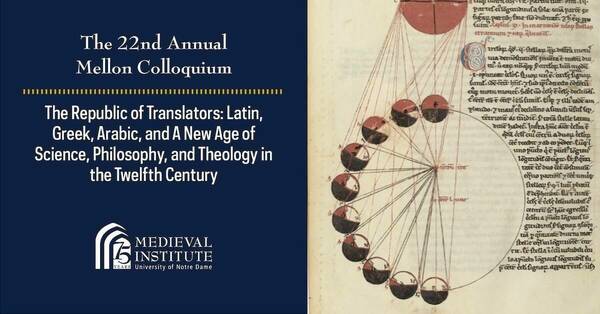The 22nd Annual Mellon Colloquium: The Republic of Translators: Latin, Greek, Arabic and a New Age of Science, Philosophy, and Theology in the Twelfth Century

Join the Medieval Institute for its twenty-second annual Mellon Colloquium. The colloquium is a half-day public seminar discussion with the institute's 2023–24 Mellon Fellow, Prof. John Mulhall (Assistant Professor of History, Purdue University), on his book-in-progress. He will be joined by three distinguished discussants: Charles Burnett (The Warburg Institute), Peter Adamson (King's College, London, and the Ludwig Maximilian University of Munich), and Thomas E. Burman (University of Notre Dame).
Professor Mulhall's research explores the history of science and religion in the medieval Mediterranean, focusing specifically on intellectual interactions among the Islamic, Byzantine, and Latin Christian worlds. His book project is The Republic of Translators: Latin, Greek, Arabic and a New Age of Science, Philosophy, and Theology in the Twelfth Century.
This event will be held in-person as well as over Zoom. Please register for Zoom to reserve your virtual spot. No registration is required for the in-person event.
Questions about this event? Email us at medinst@nd.edu
Schedule
9:45 a.m. Refreshments
10:00 a.m. Opening remarks
10:05 a.m. John Mulhall, "The Republic of Translators: Latin, Greek, Arabic and a New Age of Science, Philosophy, and Theology in the Twelfth Century"
About the Speaker: John Mulhall's research explores the history of science and religion in the medieval Mediterranean, focusing specifically on intellectual interactions among the Islamic, Byzantine, and Latin Christian worlds. His first book project, The Republic of Translators: Islam, Byzantium, Latin Europe, and a New Age of Science and Philosophy in the Twelfth Century, examines the cultural upheaval wrought by the medieval translation movement, when hundreds of new scientific and philosophical texts were translated from Greek and Arabic into Latin. In addition, Dr. Mulhall works on the history of medicine in the Greek, Arabic, and Latin traditions, and has a particular interest in uniting his textual research with new advances in microbiology, genetics, and archaeoscience.
10:25 a.m. Thomas Burman, “Ramon Martí and Latinitas”
About the Speaker: Tom Burman's research and teaching focus on the intellectual and cultural interactions between Jews, Christians, and Muslims in the medieval Mediterranean world. He is author of Religious Polemic and the Intellectual History of the Mozarabs, c. 1050-1200 and Reading the Qur'an in Latin Christendom, 1140-1560, and co-author with Brian Catlos and Mark Meyerson of The Sea in the Middle: The Mediterranean World, 650-1650. Currently he is completing a book entitled Ramon Martí, Latin Scholasticism, and the Peoples of Many Books.
Talk abstract: In his book, John Mulhall argues that it was not inevitable that Greek and Arabic scientific and philosophical texts would be translated into Latin in the Middle Ages. Rather, Latin scholars, thirsty for new, better texts, went to extraordinary lengths to make Aristotle, Ibn Sina, and Ibn Rushd available to the Latin world (Latinitas) at a particular point in the development of its intellectual culture. In this presentation I will argue that it was likewise not inevitable that the Iberian Dominican religious polemicist Ramon Martí (fl. 1250-84) would write his polemical works in Latin—his knowledge of Arabic and Hebrew was such that we can easily imagine him writing directly to Muslims and Jews in those languages. That he chose Latin indicates that, like the translators, his cultural production was oriented toward Latinitas and is best understood as an intervention in its internal theological debates.
10:45 a.m. Coffee Break
11:00 a.m. Charles Burnett, "Hādūs, Hermes and the Indians: the Transmission of an Alternative Curriculum of Science"
About the Speaker: Charles Burnett's research centers on the transmission of texts, techniques and artifacts from the Arab world to the West, especially in the Middle Ages. He has documented this transmission by editing and translating several texts that were first translated from Arabic into Latin, and also by describing the historical and cultural context of these translations. Throughout his research and his publications he has aimed to document the extent to which Arabic authorities and texted translated from Arabic have shaped European learning, in the universities, in medical schools and in esoteric circles. Other interests include Jesuit education in Japan in the late sixteenth century, the use of Japanese themes in Latin drama in Europe in the seventeenth century and the use of music in therapy and in the Christian mission.
Talk abstract: While the preeminent achievement of the Arabic-Latin translators and philosophers of the twelfth century was the establishment of the works of Aristotle as the curriculum of the study of philosophy, there are hints of another system of education based, rather, on the authority of Hādūs, Hermes and the Indians. The twelfth century can be regarded not only as the age of the rediscovery of the genuine Aristotelian tradition, but also of a Pseudo-Aristotelian tradition that transmits the works of these authorities and emphasizes the practical rather than theoretical side of science.
11:20 a.m. Peter Adamson (via Zoom), "Translation and Transmission of Pre-Modern Philosophy"
About the Speaker: Peter Adamson's primary areas of interest are late ancient philosophy and Arabic philosophy. His two monographs deal with the Arabic version of Plotinus, the so-called "Theology of Aristotle," and with al-Kindi (d. after 870 AD). He has devoted articles to several figures of the Greek tradition: Aristotle, Plotinus, and Porphyry; and numerous philosophers of the Arabic tradition, including al-Kindi, Abu Bakr al-Razi, Yahya Ibn 'Adi, Miskawayh, Avicenna, and Averroes. He has also edited several books including, most recently, In the Age of Averroes published by the Warburg Institute. In 2012 Adamson moved to the LMU from King's College London, which is the home of a research project he oversees, on "Natural Philosophy in the Islamic World," funded by the Leverhulme Trust. He is also the host of the History of Philosophy Without Any Gaps podcast.
11:45 a.m. Lunch (provided)
12:15 p.m. Questions and Discussion
1:00 p.m. Conclusion